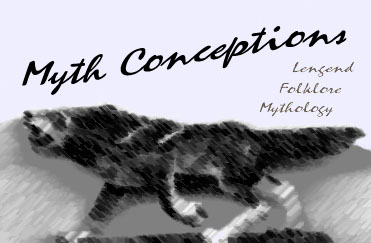|

Mythic Masculinity
by jaimie l. elliott
The Ultimate He-Man
Heracles was the greatest and most powerful of the Hellenistic
heroes. He once held up the world upon his massive shoulders. He slew
the monstrous Nemean lion with his bare hands and used its impenetrable
skin as his armor. He impregnated 50 women, the old-fashioned way, in a
single night. When he died, he was raised to Olympus as a god. His
prowess, both physically and sexually, resounds throughout history as
the paragon of masculinity. He is often viewed more as a force of
nature, dangerous and temperamental, the personification of yang.
He was the ultimate he-man... and very much bisexual.
Before the bodybuilders and power lifters of modern times
jettison their patron of strength, it must be noted that the ancient
Greeks did not have issue with Heracles' male lovers. On the contrary,
his bisexuality mirrored the pederast relationships prevalent at the
times, where an older man tutored a boy as part of the
initiation into manhood (and it must be noted that the relationship was
not always sexual in nature). Mythology is more than arbitrary fantasy;
it is a symbolic representation of the society that created it. The
institution of Greek pederasty was no different.
Not surprisingly, this aspect of Greek society and mythology
was suppressed or ignored by Western culture for centuries. Even today,
Heracles' bisexuality is either omitted or treated as an alternative
view (my own emphasis in bold):
"He was an insatiable lover of women and, according
to some, also took his young squire Hylas as a lover."
- Leeming, David: The Oxford
Companion to World Mythology. Oxford University Press
Granted, the quote could mean the author only questions the
Hylas reference without judgment about Heracles' overall sexuality.
However, the very fact that the text uses a qualifier on just one of
many identified male lovers implies a different standard. An ancient
Greek would most likely have simply accepted "...an insatiable
lover of both women and men" and left it at that.
An Even Older Hero
It becomes more complicated, though, when the culture in
question is not adequately understood.
Controversially, Gilgamesh is another mythological hero who's
sexuality has been a topic of discussion. Cast in the same mold
Heracles and predating him in written form by a millennium, the
two-thirds god, one-third man God-King from ancient Mesopotamia had a
penchant for sowing his seeds among the soon-to-be brides of Uruk.
Understandably, this angered the men of Uruk (the women were oddly
silent about the situation). To bring the hero under control, the gods
create the feral Enkidu to confront Gilgamesh. Tamed by the
prostitute-priestess Shamhat, Enkidu arrived in Uruk and a colossal
wrestling match ensued that lasted the entire day. In some versions,
the match ended in a draw or with Gilgamesh barely winning. Regardless,
Gilgamesh and Enkidu became best of friends and treated each other as
equals.
At this point, the interpretation becomes sketchy. Translating
and maintaining proper context in modern languages can be troublesome.
Doing so with ancient, lyrical Babylonian is nigh impossible. With
scant understanding of the culture, certain phrases are difficult to
interpret. One in particular, repeated in various forms while Gilgamesh
recounts to his mother a dream, raises eyebrows:
"You loved [Enkidu] and embraced him as your wife ."
- Kovacs, Maureen Gallery: The
Epic of Gilgamesh. Stanford University Press
The ambiguity in the translation has caused a long-running
debate within academia as to the relationship between Gilgamesh and
Enkidu. I suspect that it mirrored what was culturally acceptable at
the time, as per Heracles, and may have been interpreted differently at
different periods of history. We know their views on sex were different
from ours. For example, the priestesses of Ishtar, a major goddess,
practiced prostitution as part of their worship. While there is doubt
to the manner of affection between the two heroes, the depth
of affection cannot be understated. Enkidu's death devastates Gilgamesh
and spurs him on his futile quest for immortality. If Enkidu was not
his lover, he certainly was his soul mate.
Modern (Re)Interpretations
One only has to look at Disney or Marvel Comics to see how
Heracles is revamped for modern times. He is bereft of his rage, his
bouts of madness, his sexual appetite. He acts somewhat whimsically,
often boyishly. Although his physical strength remains, he is no longer
a force of nature. He has, in essence, become sanitized for the masses,
a pale version of his former self. In fact, he is more commonly known
by his Roman name Hercules, his older name sounding antiquated.
Gilgamesh, despite being one of the oldest of literary works,
will most certainly never achieve the level of familiarity of the
Greek. His culture is too far removed from our own. Few know of his
origins, his impact on subsequent mythology, and the fact that
Babylonia is now Iraq. Gilgamesh's potential, from a marketing
standpoint, would seem doomed to be a buddy movie with his hairy friend
Enkidu as they romp through Acadian forests.
Cynicism aside, we must remember that mythology adapts to the
current society, even if borrowed from another culture. While perhaps
frustrating for academia, the truth is as society evolves, whatever
represents society must evolve with it. Society will pick and choose
what aspects of a particular myth should be relevant. For example, as
of the time of article, the homosexual nature of Gilgamesh and Enkidu's
relationship is excluded from the Wikipedia entry on the Epic of Gilgamesh.
In my personal opinion after perusing the discussion tab, some of the
editors almost seem offended by the concept and their editing reflects
this. Even the Heracles
entry on his male lovers is not without a spat or incidents of
vandalism. Despite humankind's insistence of being beyond mythology,
the truth is that our discussions reveal our subconscious need for
mythology to possess certain meaning. As our perceptions change, one
way or another, over time, so to will our representation of
ever-changing myth.
Spelunking the Mythology
External Links
There are numerous sources on the World Wide Web regarding
Heracles, Gilgamesh, and their sexuality. Wikipedia is a good
place to start.
References
Maureen Gallery Kovacs ; The Epic of Gilgamesh, 1989, Stanford
University Press
© 2007 Jaimie L. Elliott
 Mr. Elliott currently
resides in Marietta, Georgia, with a wife and step-daughter, where he
spends much of his time working as a project manager for IBM. His first
love is fantasy, although he dabbles in poetry and literary fiction as
well. He won first prize in the short fiction category in the Georgia
Writers Association yearly contest and has been published in Aphelion
and Swords Edge. He's currently looking for an agent for his novel Vicious
Moon Cats. Mr. Elliott currently
resides in Marietta, Georgia, with a wife and step-daughter, where he
spends much of his time working as a project manager for IBM. His first
love is fantasy, although he dabbles in poetry and literary fiction as
well. He won first prize in the short fiction category in the Georgia
Writers Association yearly contest and has been published in Aphelion
and Swords Edge. He's currently looking for an agent for his novel Vicious
Moon Cats.
Comment on this story in the Aphelion Forum
Return to Aphelion's Index page.
|




